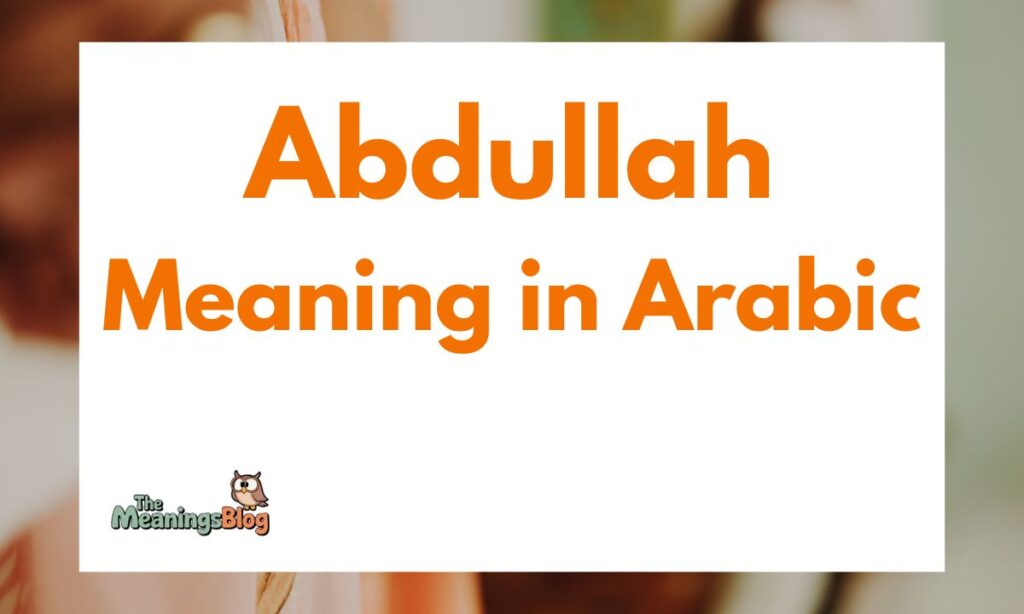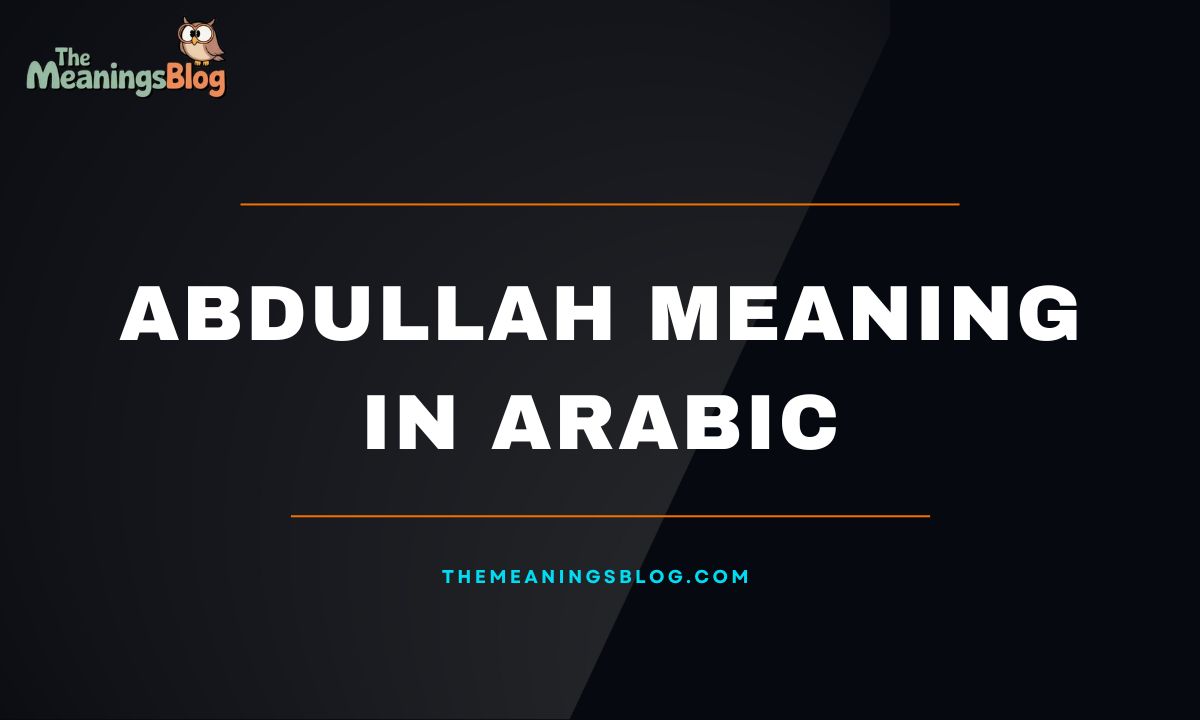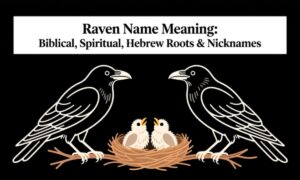The name Abdullah is one of the most loved and respected names in the Arabic language. It reflects deep faith and devotion to God. Understanding Abdullah Meaning in Arabic helps us connect with its spiritual and cultural value.
In Arabic, Abdullah means “servant of Allah.” It comes from the words Abd (servant) and Allah (God). This name carries a sense of humility, worship, and closeness to the Creator.
Abdullah Meaning in Arabic

Abdullah means God’s devoted servant throughout Islamic tradition worldwide. The name Abdullah Meaning in Arabic, combines two powerful Arabic elements. “Abd” means servant, and “Allah” means the Almighty God. This represents deep spiritual commitment and religious devotion always.
Arabic speakers recognize Abdullah as a name with spiritual weight. The term reflects Islamic values of humility before God’s will. Pronunciation follows the pattern “Ab-dul-lah” with clear emphasis. Understanding Abdullah meaning helps explore Islamic naming practices comprehensively.
Key Points About Abdullah Meaning:
- Abdullah meaning represents Islamic faith and divine servitude perfectly
- The name carries historical importance from the Prophet Muhammad’s father
- It reflects the servant of Allah in Islamic theology
- Abdullah is among the most common Islamic names globally
- The name symbolizes devotion and humility before God always
Read More: Hayati Meaning in Arabic
Linguistic Root and Grammatical Usage
Abdullah develops from the Arabic root ع-ب-د (abd) fundamentally. This root connects to worship, servitude, and spiritual obedience traditionally. The linguistic root ع-ب-د appears in many related words. Understanding this foundation helps comprehend Arabic theophoric names effectively.
The term follows Arabic grammar rules called Idafa construction precisely. Idafa creates possessive relationships between words using specific structure patterns. Abdullah combines “Abd” plus “Allah”, creating a meaningful compound formation. This Arabic idafa construction remains common in many Islamic names today.
| Element | Arabic | Meaning | Function |
| Root Letters | ع-ب-د | Worship, Servitude | Base foundation |
| First Part | عبد (Abd) | Servant | Descriptive noun |
| Second Part | الله (Allah) | God, The Almighty | Possessive complement |
| Grammar Type | Idafa | Possessive construction | Arabic structure |
| Complete Name | عبد الله | Servant of God | Full meaning |
| Similar Names | عبد الرحمن | Servant of Merciful | Same pattern |
| Root Connection | ع-ب-د | Worship terminology | Linguistic basis |
| Language Family | Semitic Arabic | Classical language | Modern usage |
Examples of “Abdullah” in Arabic Sentences
Example:
- Arabic: عبد الله يذهب إلى المدرسة كل يوم.
- English: Abdullah goes to school every single day.
Example:
- Arabic: قابلت عبد الله في السوق الأسبوع الماضي.
- English: I met Abdullah at the market last week.
Example:
- Arabic: عبد الله طالب مجتهد في الدراسة.
- English: Abdullah is a hardworking and dedicated student.
Example:
- Arabic: والد عبد الله معلم في المدرسة الثانوية.
- English: Abdullah’s father is a high school teacher.
Example:
- Arabic: استمعت إلى حديث عبد الله الجميل.
- English: I listened to Abdullah’s beautiful and interesting conversation.
Example:
- Arabic: عبد الله يحب القراءة والكتابة والتعلم.
- English: Abdullah loves reading, writing, and continuous learning.
Example:
- Arabic: ذهبت مع عبد الله إلى المسجد أمس.
- English: I went with Abdullah to the mosque yesterday.
Example:
- Arabic: عبد الله من أذكى الطلاب في الفصل.
- English: Abdullah is among the smartest students in class.
Example 9:
- Arabic: سألت عبد الله عن الدرس الصعب.
- English: I asked Abdullah about the difficult lesson.
Example 10:
- Arabic: عبد الله يساعد والديه في البيت دائماً.
- English: Abdullah always helps his parents at home daily.
Difference Between Abdul and Abdullah Name
| Aspect | Abdul | Abdullah | Comparison |
| Complete Name | Incomplete without suffix | Complete standalone name | Abdullah is full |
| Arabic Writing | عبد | عبد الله | Different lengths |
| Meaning Alone | “Servant” (unfinished) | “Servant of God” (complete) | Abdullah is complete |
| Common Usage | Requires divine attribute | Stands alone perfectly | Different usage patterns |
| Examples | Abdul-Aziz, Abdul-Karim | Abdullah (no addition needed) | Abdullah needs nothing |
| Frequency | Less common standalone | Very common globally | Abdullah most popular |
| Islamic Practice | Used with Allah’s names | Direct Islamic term | Abdullah traditional |
| Completeness | Requires completion always | Fully formed name | Abdullah complete always |
| Child Naming | Not typically used alone | Preferred for newborns | Abdullah chosen more |
| Root Formation | Same root ع-ب-د | Same root ع-ب-د | Identical linguistic basis |
| Modern Arabic | Formal or incomplete | Every day common name | Abdullah used it more often |
| Historical Use | Historical but less frequent | Prophet’s father’s name | Abdullah historically significant |
Cultural Significance of “Abdullah”
Abdullah represents Islamic values of humble service before God. The cultural significance of names in Islam remains deeply important. Prophet Muhammad’s father bore the name Abdullah with great honor. This historical connection elevates the name throughout Muslim communities worldwide.
Muslim parents choose Abdullah to express faith and religious devotion. The name symbolizes submission to God’s will and divine guidance. Arabic names meaning God’s servant reflect Islamic theology in practice. Abdullah connects directly to Islamic naming practice and cultural tradition.
Read More: Dua Meaning in Arabic
Common Misunderstandings or Mistakes
Many people confuse Abdullah with similar names like Abdul. The mistakes in name usage often stem from an incomplete understanding. “Abdul” remains incomplete without a divine attribute following it. Abdullah stands complete, requiring no additional words for meaning.
Another common confusion involves spelling variations like Abdallah or Abdulla. Variants of Abdullah (e.g., Abdallah, Abdulla) exist in different regions. These spelling differences don’t change the fundamental Abdullah meaning in Arabic. Regional preferences influence how people spell and pronounce the name.
| Mistake | Incorrect Assumption | Correct Understanding | Explanation |
| Abdul = Complete | Abdul alone is a full name | Abdul requires suffix always | Abdul needs completion |
| Spelling Variations | All spellings mean differently | Variants spell same name differently | Regional variations only |
| Pronunciation Difference | Each variant sounds completely different | Core pronunciation remains similar | Minor accent differences |
| Abdallah vs Abdullah | These are completely separate names | Same name, different spellings | Just regional preferences |
| Abdulla vs Abdullah | Distinct names with different meanings | Same name, shorter spelling variant | Alternative spelling option |
| Ubaidullah Confusion | Same as Abdullah exactly | Related but less common name | Similar but distinct |
| Gender Usage | Commonly used for girls | Only masculine name in practice | Male-only Islamic name |
| Modern vs Classical | Different meanings in contexts | Same meaning throughout history | Consistent meaning always |
Why You Should Learn “Abdullah”
Learning Abdullah meaning expands your Arabic language skills significantly. Understanding Arabic names teaches cultural and linguistic patterns effectively. The name in the Quran and Hadith appears throughout Islamic literature. Knowledge of Abdullah helps recognize Islamic naming conventions everywhere.
Abdullah Meaning in Arabic connects to broader Islamic studies comprehensively. Learning this term improves communication within Arabic-speaking communities substantially. The name reflects Arabic names etymology and compound word formation. Understanding Abdullah benefits students of Quranic Arabic and Islamic studies.
Benefits of Learning Abdullah:
- Recognize the Arabic name Abdullah in Islamic texts and literature
- Understand Arabic names for Muslim boys naming conventions
- Learn compound Arabic names formation patterns and structures
- Improve the Arabic grammar name structure comprehension fundamentally
- Connect the linguistic root ع-ب-د to related Arabic vocabulary
- Deepen Islamic theological understanding through name meanings
- Enhance communication skills in Arabic-speaking communities globally
- Appreciate Islamic naming practice and cultural traditions deeply
Conclusion
Abdullah Meaning in Arabic carries profound religious and cultural importance. The term means “servant of God” reflecting Islamic devotion and faith. Learning this word enhances cultural awareness and language comprehension significantly. Whether for study or conversation, Abdullah meaning remains essential in Arabic.
Understanding the linguistic root ع-ب-د opens doors to related terms. Arabic theophoric names follow patterns demonstrated by Abdullah perfectly. The name exemplifies how Arabic names meaning God’s servant work grammatically. Abdullah remains a key term in Islamic studies and Arabic language learning.
Frequently Asked Questions

Noah shares deep insights into meanings, metaphors, celebrity and Net Worth, inspiring readers with wisdom and reflection. His passion is uncovering hidden truths that bring clarity, inspiration, and spiritual growth to everyday life.








